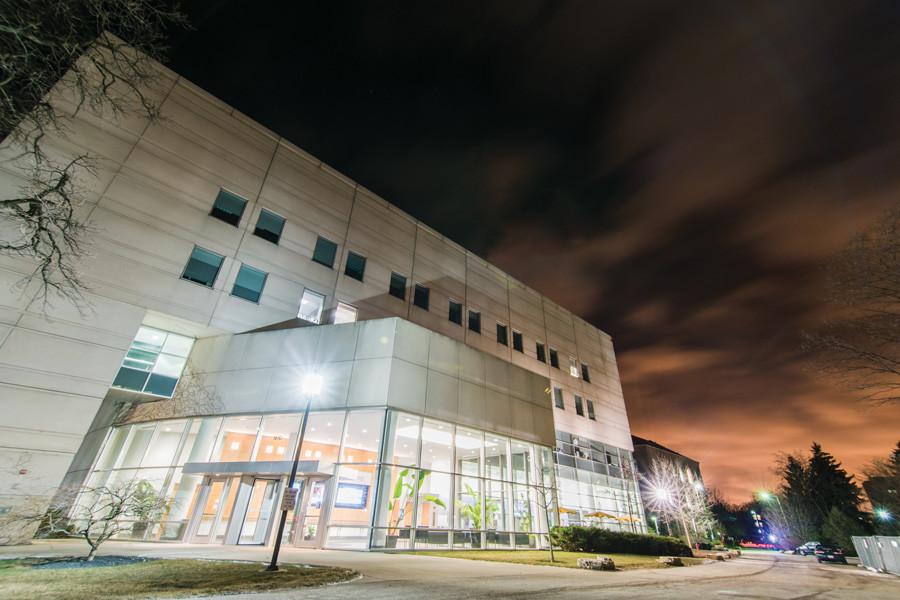Medill signs on to principles aimed at improving reporters’ safety
Jeffrey Wang/The Daily Northwestern
The McCormick Foundation Center is one of two buildings on the Evanston campus that house the Medill School of Journalism, Media, Integrated Marketing Communications. Medill signed on to a set of standards to ensure safety for reporters with a particular focus on conflict areas earlier this month.
January 26, 2016
The Medill School of Journalism, Media, Integrated Marketing Communications has signed on to a set of standards to ensure safety for reporters with a particular focus on conflict areas.
“Global Safety Principles and Practices,” was developed last February by A Culture of Safety Alliance, a coalition of major news organizations focused on international freelance protection standards. It includes various measures to keep journalists safe in conflict zones. Medill signed on to the principles earlier this month, said Medill Prof. Ellen Shearer, a member of the ACOS Alliance executive committee.
The principles and practices address journalists on dangerous assignments and news organizations sending reporters to unsafe places. They recommend, for example, journalists know basic skills for themselves or injured colleagues before they go out on assignment and for editors to show equal concern for the welfare of freelancers, local journalists and staffers.
Signing the initiative was a way for the school to both teach responsible and safe reporting to its students and honor the legacy of James Foley (Medill ‘08), Shearer said. Foley, a freelance reporter, was executed by the Islamic State in August of 2014 after spending almost two years in captivity.
Although most signers of the principles and practices are professional news organizations, Medill signed on to demonstrate its support for safe and responsible practices, said Shearer, who is also co-director of the Medill National Security Journalism Initiative.
“It’s just so dangerous now to be a conflict reporter, (so) these principles are really crucial to ensuring that people can get the news they need about the important issues of conflict and terrorism, and that reporters can do that relatively safely,” Shearer said.
Medill has always taught ways to remain safe in conflict zones, said Medill Prof. Timothy McNulty, co-director of the Medill National Security Journalism Initiative. In the past, foreign correspondents enjoyed a degree of neutrality in conflicts, but recent hostility toward reporters has created new risks, he said.
“The principles here are things that grew out of both the experience conflict correspondents have and what we try to teach at Medill,” McNulty said. “It’s important to train students to think about the various dangers and how to minimize them.”
The principles and practices will probably not directly affect University policy regarding students doing journalism abroad, Shearer said. Northwestern already has even more stringent measures in place to ensure the safety of students, she said.
Still, signing on to the principles is an important way to reflect on the experiences of correspondents, said Medill Prof. Douglas Foster, who leads Medill’s South Africa Journalism Residency program. Foster said faculty and students on the South Africa program will likely discuss these principles and practices as well as the sacrifices of Foley and other correspondents.
“We wouldn’t be doing our duty to ourselves, to our students, if we didn’t include a conversation about both what the principles that underpin the wonderful journalism that James did and also this frank warning about a terrible cost that was paid by him and others and by his family,” Foster said.
As staffed correspondents are increasingly replaced by freelance reporters, who generally receive less support from news organizations, the need for measures like the ACOS Alliance principles is increasing, said Medill Prof. Craig Duff, who worked as a correspondent in the Middle East.
“We are creating the next generation of not only journalists, but also editors and leaders and managers of news organizations,” Duff said. “We need, from the very beginning, to make sure they are adhering to practices that are the best practices and global safety is one of them.”
Email: [email protected]
Twitter: @matthewchoi2018


